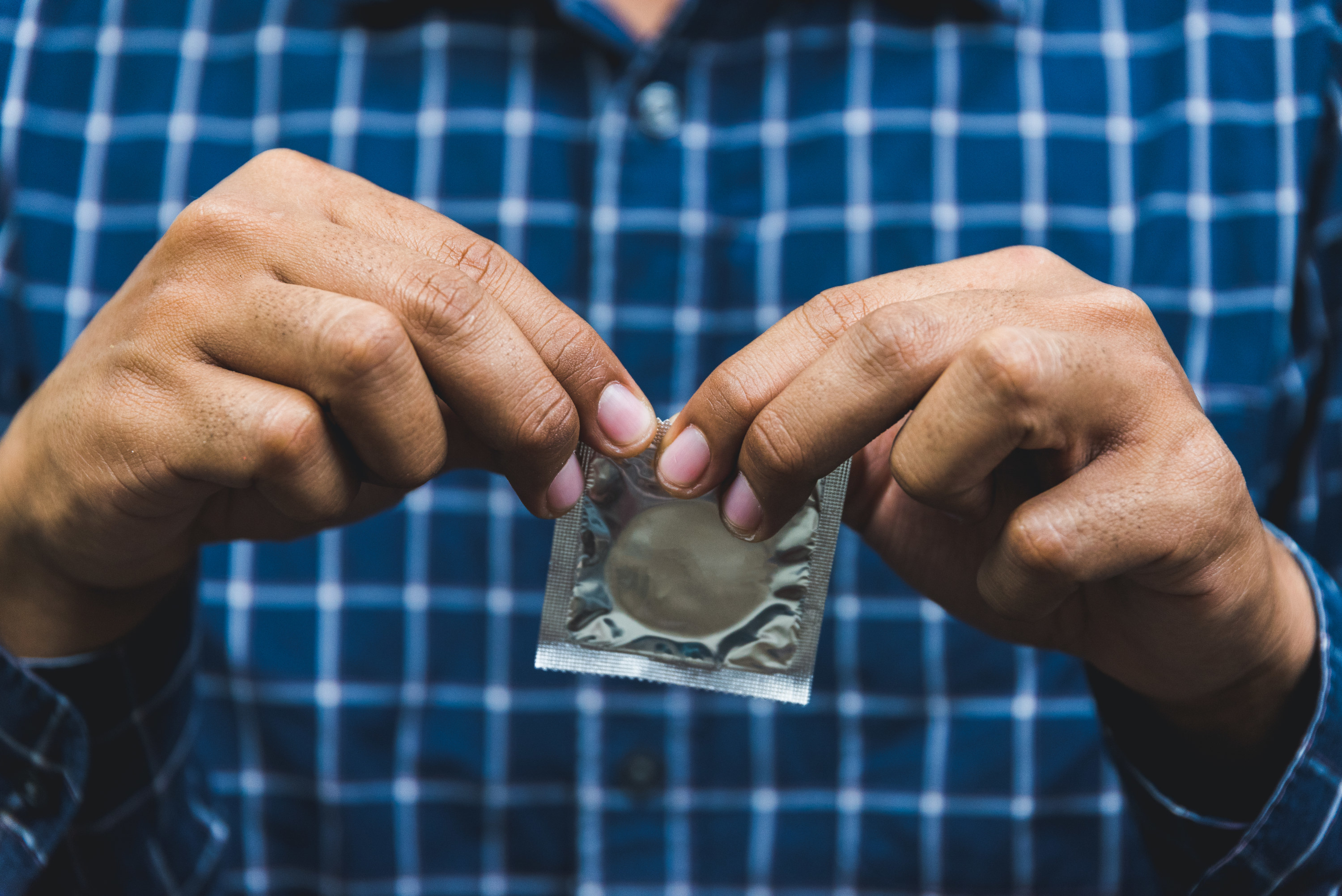Although it's way less taboo to talk about sex these days, it's still a topic that some people might not feel comfortable openly discussing — let alone asking questions about.

But here's the thing: It's completely normal to be curious about exploring different areas of sex — or sex education. Maybe you're wondering why your sex drive is low or how you can go about introducing a new kink into the bedroom, but you're not sure who to turn to with those questions, and you're over googling them.

So I asked the BuzzFeed Community to let me know what questions they had about sex but are too shy or slightly embarrassed to ask. And then I enlisted the help of experts to answer them: New York City–based psychotherapist and sex therapist Dulcinea Alex Pitagora, PhD, LCSW, CST; psychotherapist Salima M. Ndoye, LMFT; and certified sex therapist, board-certified sexologist, and licensed marriage and family therapist Jenni Skyler, PhD, LMFT, CST.
Note: Some responses and questions have been edited for length and/or clarity.
Now, let's get into it. And if you have other questions that you would still like the answers to, leave them in the comments — and I'll try to get them answered in a future post!
1. "I’m a 31-year-old woman who has never had sex. I had some health issues in my college years, so I feel like I missed the period when many of my peers were having sex for the first time. I have friends and, I would say, an average social life, but I don’t date much and haven’t been interested in anyone romantically for a long time. I would like to find a partner, but the more time passes, the more concerned I am that admitting my inexperience sexually to any prospective partner would be embarrassing. If I do start seeing someone, is it OK *not* to tell them the truth or to embellish a little?"
—Anonymous
Jenni Skyler: I think it's worth mentioning that having wild sexual explorations in college years is a social narrative that need not fit for everyone. If we obligate ourselves to fit into a substandard narrative, then we aren't living our most authentic lives.
I'm far more a fan of authenticity and transparency rather than lying or embellishing. If you start a relationship with a lie, then maintaining that can feel difficult and may eat you alive. You will be far more concerned about keeping up the lie rather than being in the moment and allowing yourself to explore.
As for your limited experience, this is totally OK and more common than you may think. We all have different experiences on different timelines. You had health issues that changed the trajectory of your sexual exploration. Again, this is OK. If a prospective date or partner doesn't have compassion for this, then they aren't worth dating.
Even if you didn't have health issues but simply made a choice to abstain, that's also OK and, again, should be respected by a prospective date. My advice is to slow down and access your higher self, where courage and confidence live. This way, you can date and explore sex at your pace in a fun and pleasurable manner.
2. "As a trans male, how I can feel more masculine in bed? I feel like not having a penis makes it much harder for me to dominate."
—Anonymous
Dulcinea Alex Pitagora: The first step is realizing that sexuality, eroticism, masculinity, and dominance all start in the brain, not in the bedroom — or wherever you like having sex. Masculinity has very little to do with whether you have a penis or not. Many very feminine people have penises, for example.
We’re all socialized to equate masculinity with dominance and to think of those constructs in a very rigidly defined way, but masculinity is expressed in a wide range of ways — as is dominance — so you really get to decide who you are and how you want to express yourself. The next thing to understand is that if you’re into being dominant, you’ll need a partner who inspires your dominance, is into being submissive, and is into being submissive to you.

3. "Is it wrong for me to get turned on by occasionally being 'used for my body' by my husband? There have been occasions when I’ve woken up to him groping me (or, once, masturbating), thinking I’m still asleep."
"After it happened, because he’s an honest guy, he would actually be transparent about it the next morning, and in order not to discourage him from doing it again, I told him, 'If I consent to it while I’m awake, you can do it to me while I’m asleep,' but he hasn’t done it since — and I’m actually disappointed. He doesn’t know I was awake for parts of it. Is this wrong? Is there a deeper, darker meaning to my desires? I would be upset about anyone taking advantage of an unconscious person under any other circumstance. But if this is a normal, healthy fetish, are there better ways to communicate this to my husband without embarrassing either of us?
"Just to be clear, I wholeheartedly agree that consent is the most important part of healthy sexual relationships. Also, my husband is incredibly respectful of my comfort and enjoyment, emotionally and physically, in all parts of our relationship. We have a nice sex life, but it’s not extremely exciting after seven years together."
—Anonymous
Skyler: Many people get turned on by being objectified or "used," as you said. The benefit of being married or in a committed partnership is that you can allow yourself to be as vulnerable as possible, including objectifying each other. In a way, it’s one of the only places you can safely objectify and be objectified, knowing that it’s birthed from consent and arousal. I even tell some of my clients that this is like a form of "sacred objectification." I encourage objectification for couples who need to be less polite with one another and would rather be a bit more racy and sexy.
In terms of communicating this to your husband, you can have him read my answer above, and let him know what a turn-on it is when he initiates mid-sleep. Right now, it seems like you gave him permission, but he might think you are just acquiescing and offering him a gift. This is really different than the fact that it turns you on. Oftentimes, hearing our partner's turn-ons ends up turning us on.
If, for some reason, he seems embarrassed, don't back away. Many couples never get clarity about their sex lives because it feels embarrassing to talk about it. Then they suffer in silence. Get curious about why he might be embarrassed, and reinforce that it turns you on!
4. "My husband and I have very different tastes when it comes to sex. He likes it one way, and I like it another way. How do I go about telling him what I like sexually without him getting defensive?"

5. "As a woman, will I find that my first time having sex is more uncomfortable if I’m in my mid-20s?"
—Anonymous
Salima M. Ndoye: Not everyone will have the same experience. For those who will experience discomfort — if not medically related — it could be uncomfortable due to anxiety, making it difficult to relax; not being lubricated enough; or not easing into enough foreplay. Communicate to your partner what feels good and what doesn’t. It’s important to have sex when you are ready, without any pressure.
6. "I am a bisexual woman, and my partner is a man. I've only had sex with one woman, and the rest have been men. While I love my partner and want to be with them and have a life with them, I keep thinking of never being able to sleep with a woman again — and I keep having sexual fantasies about it. How do I manage this feeling?"
—Anonymous
Pitagora: I’m assuming you're in a monogamous relationship, so my first question is, Can you talk to your partner about trying nonmonogamy? If your partner is not open to nonmonogamy, it’s a good idea to talk about how you’re both defining monogamy. This is something that monogamous couples rarely do, but you can learn so much about what you’re each comfortable with and how you can redefine your relationship structure while remaining monogamous.
You never know. You might agree to a monogamous relationship structure that can expand to contain some sort of interaction with women. If not — and your monogamy won’t allow for exploration of any kind — you might consider expanding on the fantasies that you’re already having and bringing them into sexual interactions with your partner.

7. "I haven't given a blowjob before, and I'm nervous about whether to use a condom when the time comes. I know it's a safe thing to do, but I'm not sure if it is super common (or not) — or how the guy will react. Would be grateful for any tips!"

8. "I was on antidepressants for four years and recently weaned off of them. One of the side effects of the drug was a low libido. But even though I’m off them now, I’ve noticed I still have no sex drive whatsoever. Everyone I talk to says it’s no big deal, it happens. But not for me. I used to have a very healthy libido and sex life — and now it’s nonexistent and affecting my relationship. Is there any hope that my libido will return, now that I’m off the medication? How can I get it back?"

9. "Is squirting even possible? My partner keeps going on about how great it would be if I squirted, but I don't actually even know if it's possible — and if it is, how to make it happen."
—Anonymous
Pitagora: Yes, it certainly is, though all bodies are different, and it’s not always possible or even preferable for everyone. Squirting is a type of ejaculation that is often paired with an orgasm, but sometimes it’s not. Sometimes orgasms feel differently when they happen in conjunction with squirting. Typically, those who squirt get there by feeling very turned on — however that happens for you — then by stimulating the G-spot. I recommend doing some exploration by going to Kink Academy and doing a search for "squirting."
10. "I’m a straight guy who wants to experience anal play. How do I go about that?"
—Anonymous
Pitagora: The first thing to do is get used to talking about your desires and preferences, then tell your partner about it, and talk about how you might collaborate to make it pleasurable for both of you. If you’ve never had receptive anal sex, it’s a good idea to masturbate with anal toys so you can get used to the sensation (remember to use plenty of lube!).
If it’s your first time, ask your partner to go very slowly; spend a lot of time getting aroused first — however that happens for you; use lots of lube; stimulate the anal opening; and start with one or two well-lubed fingers (gloved hands often feel better), then slowly start with a smaller toy. It doesn’t need to hurt (unless you want it to), so if it does, slow down, use more lube, and a smaller toy, or go back to fingers.
11. "I'm 35 years old and just started therapy after dealing with the death of the person who molested me when I was a child. Do you have any tips for how to have more sex in a healthy, consensual way?"
—Anonymous
Skyler: For this issue, I think an effective therapist can go a long way. I would even find a therapist who specializes in sexual trauma. Being molested as a child is a big deal. This is an enormous violation that can often be accompanied by a great deal of physical and emotional pain. For some survivors, it can be even more complicated by the fact that the act of sexual contact felt pleasurable, even though it was an absolute violation. Either scenario can shut down our sexuality.
You are already on the path to cultivating healthy sexuality, since you have put that intention out to the world. Finding a partner who understands your need to go slow and pause during sex at times when you might be triggered is also helpful. Many survivors say yes to sex or certain sexual activities from a place of ambiguity. Rather than have ambiguous consent, it's key to understand your needs and desires, as well as your boundaries. Almost as importantly, being able to voice your desires and boundaries will help you access the pleasurable and consensual sex you want.
Lastly, I would consider reading some books to help you on your journey, such as The Body Keeps the Score and Victims No Longer.

12. "Is it normal for penetrative sex to sometimes feel overwhelming? Not necessarily painful, but more like overstimulation."
—Anonymous
Pitagora: Given the vast range of sensations the body is capable of, I try not to use the word "normal" to describe any kind of sex. The majority of people consider penetrative vaginal sex to be "normal," but if it’s overwhelming and not pleasurable, it might not be ideal for you. It doesn’t necessarily mean anything is wrong with you, either.
Luckily, there are so many other ways to have sex that you might enjoy more. I would focus on exploring the kinds of sex that feel best to you and do more of that. If you really want to engage in penetrative sex, masturbate with smaller toys to see if that feels better, and/or ask your partner to go slowly, and explore to see whether certain areas and movements feel better than others. And it’s almost always a good idea to use more lube!
13. "How do you know if you are asexual or just have a fear of intimacy?"
—Anonymous
Skyler: This is a very tricky question. I think it's possible to be asexual without fear of intimacy, and/or be asexual based on a fear of intimacy. Everyone has a different history and understanding of their sexuality. Many people on the asexual spectrum have happy marriages that have limited to no sex involved. For these people, their asexual orientation is not about a fear of intimacy but, rather, a lack of arousal and sexual interest.
That said, there are asexual individuals who have experienced a difficult childhood whereby intimacy was quite unsafe or inaccessible — either because there was neglect, abuse, or both. Some people grow up only knowing and understanding relationships as dangerous, versus the possibility of a relationship being a safe haven. As they emerge into adulthood, it is common to protect against feeling vulnerable in a relationship. There are many ways people guard against vulnerability and intimacy, with avoidance of sex being one of many strategies.

14. "Though physically it feels good, I can't climax with my partner, two years into our relationship. We are a female-male heterosexual relationship, but we both identify as queer and bisexual, respectively."
—Anonymous
Pitagora: I really try not to make assumptions about sexuality, but given the lack of explicit question here, I’ll assume there’s some sort of unasked question about orgasms. It could be that you’re wondering why you’re not orgasming, should you be worried about it, or is there something you can do to orgasm — along those lines. The first thing I’ll say is that we’re all socialized to believe that orgasms are the goal of sex, sort of like punctuation that lets us know sex is finished. And this is totally incorrect, in my book.
Sex should be about pleasure, in whatever form you experience it, and as you’ve been experiencing, you can feel pleasure without having an orgasm. It may be possible to have an orgasm with a lot of communication about what feels good and exploration with your partner, but before any of that happens, the pressure you’re probably feeling about having an orgasm needs to be released. The more pressure you feel to orgasm, the less likely it will happen. A good place to start is to give yourself permission to feel pleasure without including orgasm as a goal, and see what happens.
15. "I am 35 and going through a divorce. I've been with only my (soon-to-be-ex) husband for over a decade. There's a lot we didn't do that I want to explore now, such as kinks and even certain foreplay activities. I am so insecure about being my age with no clue what I'm doing. Google can only get you so far. How do I explore these things so I feel somewhat prepared for the actual acts?"

